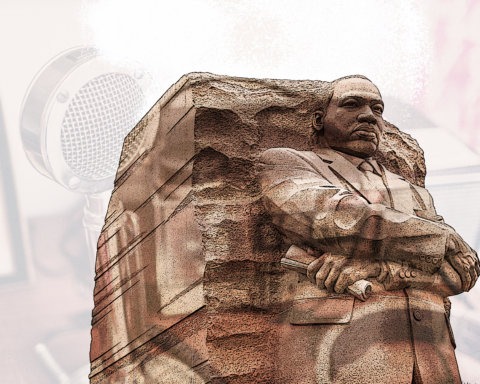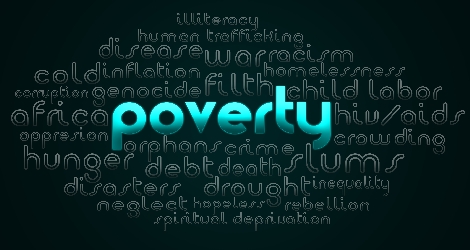[wpcol_1half id=”” class=”” style=””]
Idols: Where Capitalism Went Wrong, Theologically
When Marx talked about “commodity fetishism” he was intuiting that—contrary to current theories about secularization—the West is not irreligious; rather, money and the commodity are its new gods or idols. In other words, when all human exchanges are reduced to the calculation of monetary value, then the object of that pursuit functions as God. Moreover, what their valorization obscures from consciousness is that money and the commodity are manufactured by us. Money has no inherent value. It is something governments make and there is nothing that guarantees its worth other than government’s monopoly on violence. So much for the market… Hence, money and the commodity operate in the same way as the fetish of so-called primitive peoples.
Christian theologians were unable to include Marx’s critique of capitalism in their theological reflection for a number of reasons. They presumed money to be “natural” and missed the radical implication of Jesus’ response when someone asked if poll taxes should be paid to the Roman Empire. “He asked: ‘Whose image is on this coin?’ He then said, ‘render unto Caesar what is Caesar’s and to God what is God’s.’” Remember that those listening knew that it was written in Genesis that the human being was created in God’s image, which means that human beings were not to be sacrificed to Empire. Everybody misses that point and thinks of the passage in terms of the separation of religion and the political and economic order noted earlier. Hence, there is no adequate pushback from Christian quarters when our government sacrifices its youth and the poor to the god of Moloch.
Thus, with the exception of Walter Rauschenbush’s (1861-1918) Social Gospel and the subsequent Civil Rights Movement, Black Theology, and Liberation Theology—Christian theology has presumed the validity of Smith’s model in such a way that gospel categories had no critical bearing on the political economy. For example: the majority of white Americans in the 1920s and 1930s were not in any way informed or affected by the Social Gospel any more than the majority of African Americans and Latin Americans today are informed and affected by Black Theology and Liberation Theology, respectively. This is well documented in the studies conducted by sociologists Robert and Helen Lynd of a typical American town called Middletown (Muncie, Indiana), first in the mid-1920s and again in the mid-1930s.
The Lynds discovered that even though the typical working class person was losing ground during the depression due to the forces of industrialization and urbanization, the sermons preached in Middletown’s churches were devoid of social analysis and critique. The sermons were almost identical to ones preached in the 1890s in spite of the drastic change in the political/economic landscape. To do otherwise was to risk being labeled communist.
[/wpcol_1half] [wpcol_1half_end id=”” class=”” style=””]
Raymond Carr has reminded me, however, that the problem historically is not the lack of prominent theologians taking up the cause of the poor, but rather the suppression of their positions in Christian (particularly American) memory, as if these thinkers’ social analysis, witness, and praxis could somehow be divorced from the more spiritualized aspects of their theology. Carr, who recently defended his dissertation on Karl Barth and James Cone, reminds us that:
“In Europe, Barth laid a heavy critique of Capitalism as early as 1911 in Jesus Christ and the Movement for Social Justice in which he observed that ‘capitalism is the system of production which makes the proletariat into the proletariat, i.e., into a dependent wage earner whose existence is constantly insecure.’ He argued that capitalism is standing in the way of God’s coming Kingdom on earth. He was deeply critical of the kind of ‘competition’ among producers which basically made weaker human beings into a means to an end. He held the same critique as late as 1951 in CD III/4, 544; calling for a ‘championing of the weak against every kind of encroachment on the part of the strong.’ This was in a section where he discussed capitalism, specifically its foundation on private capital. The fact that these observations by Barth are overlooked by American Theologians demonstrates how American theology at this critical point basically functions as a form of culture Protestantism.”
Carr’s critique of American Christianity indicts all strata of society. Today, among many African American Christians, who are prone to embrace anything that their white evangelical counterparts espouse, the “Prosperity Gospel” is in vogue. The Prosperity Gospel according to my colleague, Matthew V. Johnson, in his article, “The Poverty of the Prosperity Gospel,” operates within the theoretical framework of Adam Smith and legitimates it by attributing his “invisible hand” of the market place to God’s intervention on behalf of the “blessed.” The blessed can easily identify themselves by their material prosperity which, in turn, is the measure and reward of their faith. Those who are blessed are free of want which in terms of our topic means being free of debt. In our society the ideal state for an individual to enjoy is one wherein one can say: “I don’t owe anyone anything.” However, this is quite a different ideal than the one whose absence in American society Robert Bellah lamented in his study Search for the Common Good. There probably was never a sense of common good in America from the standpoint of those who were enslaved or made landless.
[/wpcol_1half_end]






Unbound Social